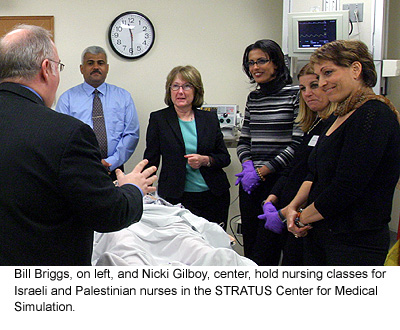BWH Welcomes Israeli, Palestinian Nurses

A contingent of Israeli and Palestinian emergency nurses and doctors cast aside traditional differences and traveled together to BWH last month as part of an unprecedented Jewish-Arab cooperative effort to bring the best and most advanced health care to the battle-scarred holy city of Jerusalem and throughout that conflicted region.
BWH's Institute for International Emergency Medicine and Health (IEMH) in the Department of Emergency Medicine hosted seven Israeli and five Palestinian nurses for two weeks of clinical emergency care observation, trauma-nursing training and exercises in the department's STRATUS Center for Medical Simulation.
“These nurses and physicians deserve the credit for making this idea a reality,” said Mark Davis, MD, MS, director of BWH's IEMH and founder of the 4-year-old Peace Through Health program.
This landmark program is helping build bridges between traditional adversaries who now work shoulder-to-shoulder as ED nurses and physicians caring for all patients. Funded by the United States Department of State, this program aims to improve health and relations between the communities in conflict. BWH is helping to train the medical personnel providing care as Hadassah Medical Organization and Augusta Victoria Hospital are working together in making significant strides in the delivery of emergency care.
“One thing we heard more than once during their two-week visit is that the next time an Israeli nurse calls a Palestinian hospital for a patient transfer, he or she may know the person on the other end,” said Bill Briggs, RN, MSN, nurse manager, Emergency Department.
Emergency Department nurse educator Nicki Gilboy, RN, MSN, CEN; nurse practitioner Karen Doster, MSN, RNC, MPH; and Mary Kennedy, RN, MS, trauma outreach coordinator in Burn Trauma Service, joined Briggs in leading teaching sessions for the visiting nurses.
One of the visiting nurses was Khawla Abu Diab, a field nursing officer in a West Bank clinic who is responsible for training 180 nurses. “This program adds to my skills for training our nurses. It will improve our patient care in both Palestinian and Israeli systems,” she said.
Pnina Sharon, head nurse in the Emergency Department at Hadassah Ein Kerem in Jerusalem, praised her BWH hosts for being so organized and structured with the classes. “With every subject, there are a couple new things I will take back home to my colleagues,” she said.
As such emergency health care partnerships between the three countries flourish, BWH staff stand to learn a lot from their Jewish and Arab counterparts, said Briggs. “We have much to gain from their knowledge in preparing to handle mass casualties,” said Briggs. “Our counterparts have learned how to do more with fewer resources.”